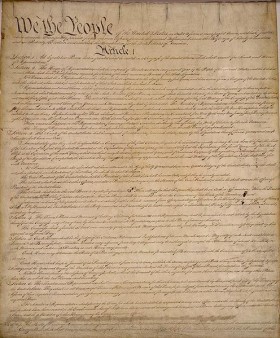 Can legal attempts to change Cannabis Policy survive in the modern Legal system? In my last post on Cannabis Legalization I began by saying there is a legal theory, Living Document, advocated by many, which makes those attempts futile and any victory short-lived. I will go into more detail on what is wrong with that, but first, I think I should explain what I think is the right theory, Textualism.
Can legal attempts to change Cannabis Policy survive in the modern Legal system? In my last post on Cannabis Legalization I began by saying there is a legal theory, Living Document, advocated by many, which makes those attempts futile and any victory short-lived. I will go into more detail on what is wrong with that, but first, I think I should explain what I think is the right theory, Textualism.
Textualism means interpreting the words as they are written. “Congress shall make no law…” should mean that CONGRESS SHALL MAKE NO LAW concerning the issues that follow. The fact that Congress makes laws about such cherished items as Speech, Assembly, Religion, and Redress, and the fact that we allow Congress to do so, shows how far we have gotten from a Textualist ideal.
We hand over our Liberties when we allow Legislators, Presidents, and Judges to claim that words on a page do not mean what they say because it is now another age. To allow this claim to go unchallenged is to ignore reason. Textualism’s so-called supporters do not always live up to their rhetoric either. Their hypocrisy saddens me, but the idea is still the correct one. The point is to remove the hypocrites, not to devolve from the idea.
I am often asked, what if the text is unclear? That is where Originalism comes in.
Textualism is not the same as Originalism. Originalism is trying to figure out what the people who wrote the Amendment or Law or clause, therein, were thinking and what they meant by it. It should be used as an aid to Textualism but it should not be the end, in and of itself.
Textualism is helpful to see where a law went wrong and how to fix it. It is common sense to “keep it simple stupid” and law should also follow that maxim. Laws should be short, easy to read and understand, and written in plain language. Our Constitution is great because it was written so that everyone could understand it. The fact it is written on hemp only adds that much more of a glow in my heart. Laws that are so burdened with complexity, so great that its own creators say you have to pass it to find out what is in it, are never good for anyone.
Textualism allows for ease of understanding and agreement. A citizenry that demands their government follow Textualism will not be surprised by how the laws will affect them.
We expect the agreements we make with people, whether promises to friends and family or contractual obligations with work and business, to mean what we agreed them to mean. We try to make those agreements and contracts as simple as possible (though I think contracts could go a long way to trying for more simplicity); we should demand our lawmakers do the same.
Textualism answers the question of who has the power to decide an issue because the Constitution answers the question of where the power to decide comes from, and which branch of government might have been delegated certain powers in the 10th Amendment. That delegated word is very important; it is the proof that the Constitution is an agreement limiting the power of the federal government in particular, and the states to a lesser extent. That delegation is the basis for the Federalist system that the Constitution creates, or in other words, Federalism is created by a Textual reading of the 10th Amendment. Federalism creates security for the states to pass cannabis reform without fear of federal interference.
Living Document Theory weakens the answer of who has the power to decide an issue, since under that theory, the limits can be ignored. And as a consequence, the federal government has taken more power to itself, and concentration of power is dangerous to free society. Advocates of LDT try to cloak their intentions, but reason shines its light on their deception. Would you build a house with a single circuit-breaker?









